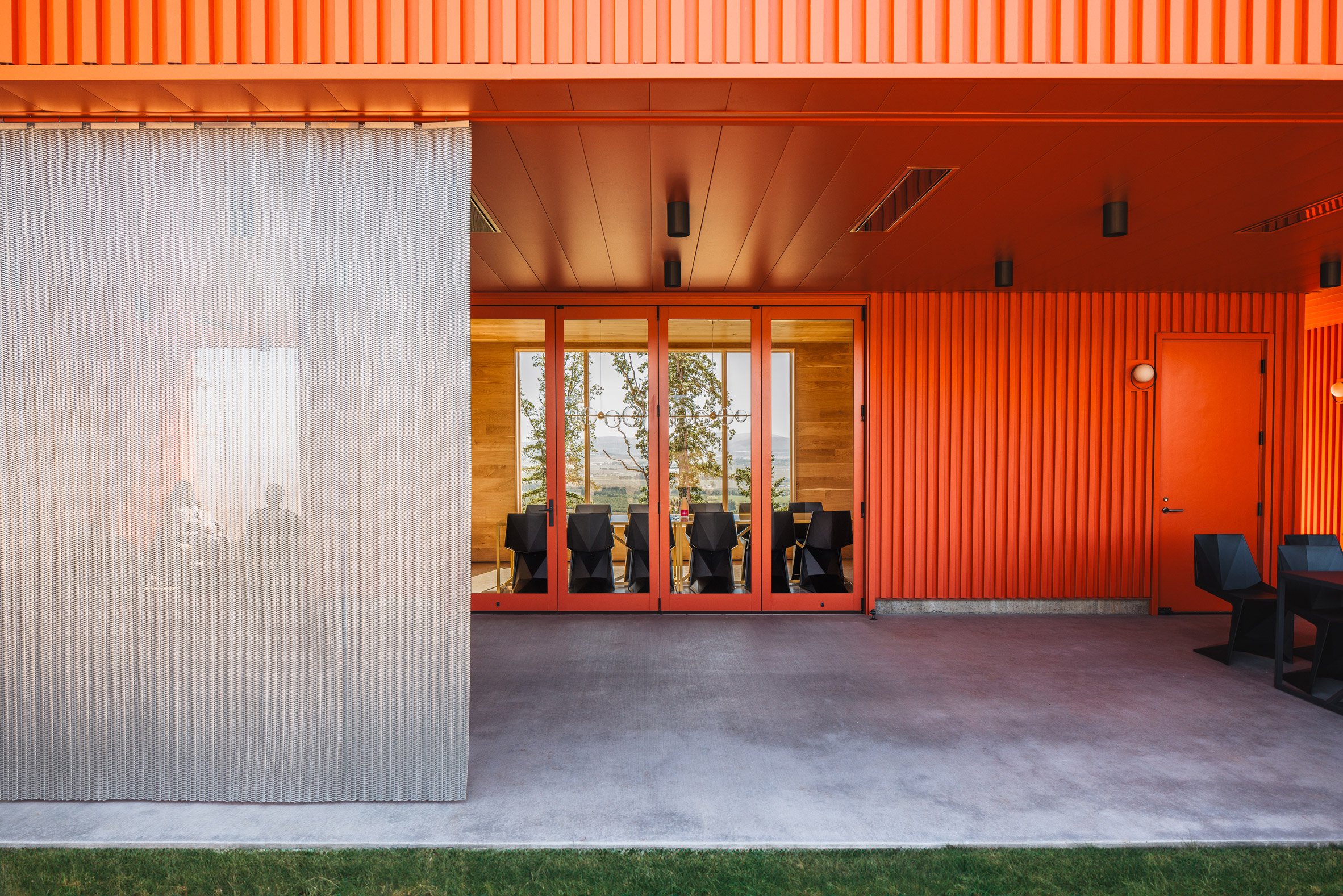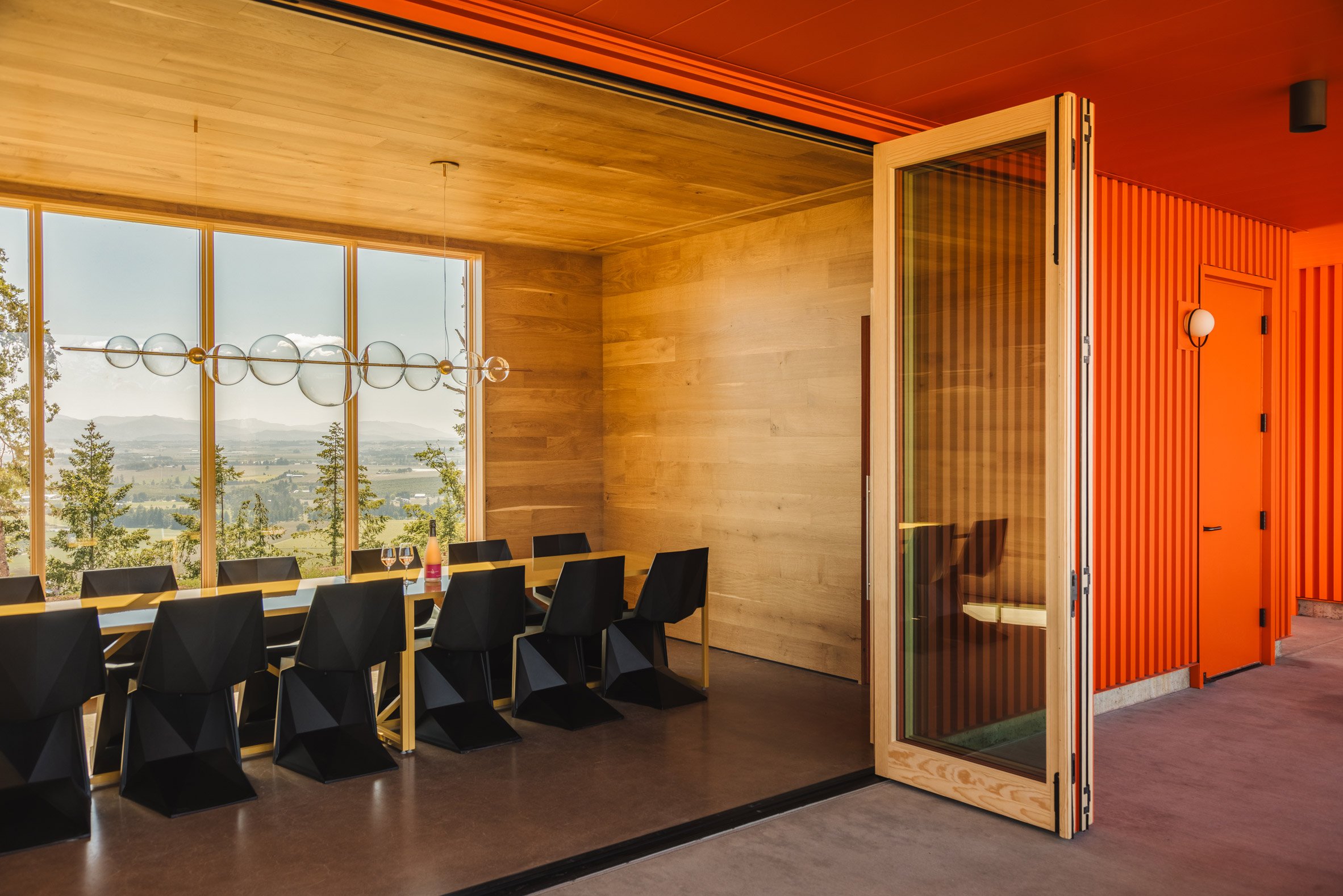"건축은 고정된 것이 아닌 유동적인 것이다." -Rem Koolhaas

 |
 |
 |
붉은 와이너리, 건축의 새로운 빈티지 시대를 열다! Waechter Architecture clads Oregon winery building with red-coloured metal
오리건주의 푸른 Willamette Valley에 자리 잡은 Corollary Wines 와이너리는 포틀랜드에 기반을 둔 Waechter Architecture가 설계한 독창적 건축물로, 붉은 금속 패널이 숲 속에서 마치 섬처럼 강렬하게 떠오릅니다. 이 와이너리는 대표 와인 레이블인 Cuvée One의 색에서 영감을 받아 브랜드의 개성과 자연과의 조화를 동시에 담아내고 있습니다.
설계의 구현과 주요 요소
붉은 외관과 나비형 지붕: Corollary Wines 와이너리의 외관은 강렬한 붉은 금속 패널로 구성되어 자연과 대비되면서도 주변 환경과의 상호작용을 고려한 디자인입니다. 나비 모양의 지붕은 Corollary Wines 로고의 상징성을 반영하는 동시에, 자연의 빗물을 모아 정원과 조경에 재활용하는 기능을 수행합니다. 이는 브랜드의 정체성을 강조하는 동시에 환경을 보호하는 지속 가능한 설계로, 방문객들에게 인상 깊은 시각적 경험을 제공합니다.
화이트 오크와 와이어 메쉬: 내부 마감재로 사용된 화이트 오크는 오리건주에서 지속 가능하게 공급된 자재로, 공간에 따뜻하고 자연적인 분위기를 조성합니다. 반투명 와이어 메쉬는 빛과 공기의 흐름을 유도하며, 외부로부터 적절한 프라이버시를 제공함과 동시에 강렬한 태양을 차단하는 기능적 역할을 합니다. 이를 통해 외부와 연결되면서도 아늑한 실내 공간을 연출합니다.
지속 가능한 디자인과 환경과의 조화
지속 가능한 자재와 기능적 설계: 와이너리는 환경을 고려한 자재와 설계를 통해 자연과의 조화를 이루고자 합니다. 외장재인 금속 패널과 와이어 메쉬는 내구성이 뛰어나 유지 보수가 용이하며, 나비형 지붕에서 수집한 빗물을 정원에 재활용하는 시스템을 통해 자연 자원의 효율적 사용을 추구합니다. 이는 현대 건축에서 지속 가능한 건축의 중요성을 반영하며, 지역 특성을 살린 자재 사용으로 지역사회와의 연대감을 형성합니다.
공간 활용과 방문객의 경험
유연한 공간 구성: Corollary Wines 와이너리는 반개방형 공간과 밀폐형 공간을 구분하여 와인 시음과 비즈니스 운영의 효율성을 극대화합니다. 테라스와 다양한 좌석은 모든 계절에 적합하게 설계되어, 방문객들이 자유롭게 자연을 체험할 수 있도록 돕습니다. 스테인리스 커튼은 날씨와 빛의 변화에 따라 공간을 유연하게 조절할 수 있어, 다양한 환경에서 최적의 사용성을 보장합니다.
결론: 브랜드 정체성과 미래 건축의 방향성
Corollary Wines의 와이너리는 붉은 외관과 지속 가능한 디자인을 통해 브랜드 정체성과 자연의 조화를 이루는 건축물입니다. Waechter Architecture의 혁신적 접근은 와이너리를 단순한 생산 시설이 아닌, 브랜드 철학을 경험할 수 있는 공간으로 재창조했습니다. 지속 가능한 건축과 환경 친화적 디자인 요소를 통해 현대 건축의 중요한 방향성을 제시하며, 미래 건축에서도 이러한 가치를 지속적으로 추구할 것입니다.
Write by ChatGPT & 5osa












Portland based Waechter Architecture used metal cladding with a red colour derived from a popular wine blend to create an angular winery on a site devastated by clear-cutting in Oregon.
Corollary Wines wanted to create a base of operations and space for entertaining on an abandoned site in Oregon's Willamette Valley that had been cut clear of timber.
After an extensive reinvigoration of the permaculture on the site, Waechter Architecture was brought in to create an "economical" structure that would represent the company and create a scenic place to host tastings and business operations.
"The clients needed an attractive, all-in one structure that could serve as an outpost for entertaining and a base of operations as their new estate vineyard takes root and matures," Waechter Architecture founder Ben Waecther told Dezeen.
"We needed to be economical in scale and with materials while providing a space that sets the tone for future development and captures the individual, unconventional, and innovative spirit of Corollary."
To fulfil these goals, the studio chose box rib metal siding for the totality of the cladding due to its ease of maintenance and prevalence in local construction.
The siding was powder coated in a red hue to reference the label of one of Corollary Wines' signature wines, Cuvée One. According to the studio, this makes it stand out as an "outpost" as the area develops for wine production and distribution.
"It adds a pop of colour as a focal point for the verdant estate and echoes the red hue of humble agricultural buildings found throughout the region," said Waechter.
Rectangular in form, the structure has a butterfly roof with each sloped aspect representing two parts of the plan, one semi-enclosed and three others that are completely enclosed.
The entry program features a small porthole window and a recessed wall that leads towards a portal that leads to the semi enclosed space. This area wraps around the enclosed space, sealed by French doors, where the primary tasting room is.
To protect the semi enclosed spaces from the elements, the Waechter Architecture team installed operable chain curtains that also work to diffuse light.
The red panelling continued on the walls of the semi enclosed place, while the interiors of the fully enclosed reception and tasting room were clad in white oak that the studio said was sustainably harvested by local, family-run company Zena Forest Products.
Oak has a special significance to the region and to the winery, which uses oak in the winemaking and storing process.
from dezeen